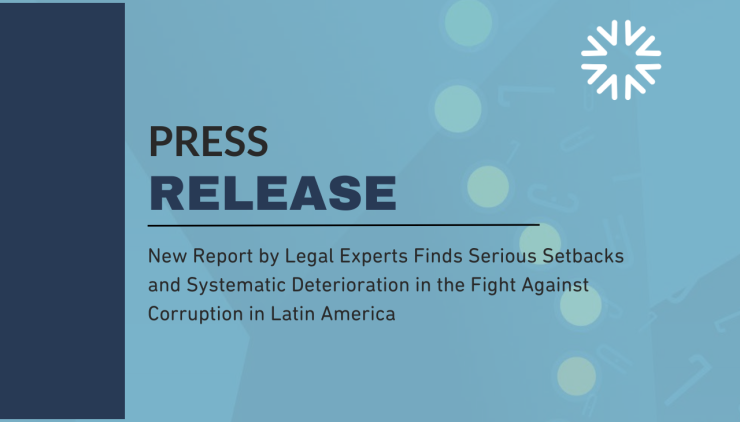This website uses cookies so that we can provide you with the best user experience possible. Cookie information is stored in your browser and performs functions such as recognising you when you return to our website and helping our team to understand which sections of the website you find most interesting and useful.
New Report by Legal Experts Finds Serious Setbacks and Systematic Deterioration in the Fight Against Corruption in Latin America
December 2024
New York, December 12, 2024 — The expansion of autocratic regimes and policies in Latin America has contributed to institutional setbacks and diminished the effectiveness of anti-corruption efforts in the region, according to the Latin America Anti-Corruption Assessment 2023-2024, published today by the Lawyers’ Council for Civil and Economic Rights of the Cyrus R. Vance Center for International Justice.
The report, available in Spanish, English and Portuguese, assesses existing legal efforts and gaps to prevent and sanction corruption in 18 countries. It identifies five major problems:
- Only a few countries have adequate conditions for anti-corruption authorities to work effectively.
- Most of the region has weak provisions, institutions and public policies for preventing corruption.
- There is a general need to create, strengthen and invest in institutional capacity to curb corruption, through sustained investment in public policy, adequate technology and equipment for institutions, and training and professionalization of personnel.
- Most countries have few or no protections for whistleblowers.
- Many anti-corruption efforts do not incorporate a comprehensive approach that considers human rights.
The report makes four main recommendations for policymakers and the legal community:
- Promote comprehensive strategies, actions and public policies to strengthen authorities’ institutional capacity on anti-corruption matters, to ensure they have the necessary resources, competencies and action tools for action to do their work effectively.
- Promote policies, strategies and actions to ensure anti-corruption authorities can maintain their independence and help curb the trend of institutional regression at administrative, prosecutorial and judicial levels.
- Refer to international best practices to improve legislation and public policies to better promote ethics and integrity in public service.
- Generate alliances and joint efforts to develop comprehensive anti-corruption systems, based on an integral and human rights approach.
Jaime Chávez Alor, Associate Executive Director of the Vance Center, said, “The growing global trend of authoritarianism has had a clear effect on anti-corruption efforts in Latin America over the past two years, since our last assessment. While the region has made some progress, and some countries continue to lead in this area, we are unfortunately seeing more setbacks than progress. The legal community must step up and take on its essential role in strengthening the rule of law and supporting anti-corruption efforts before it is too late.”
Compared with the previous edition, the 2023-2024 report identifies general backsliding across the region, despite improvement in a few specific cases. Only a few countries, including Uruguay, have the conditions to allow independent institutional work. Several others, like the Dominican Republic, have shown some progress and implemented positive practices that can serve as a regional example.
However, corruption scandals and high levels of impunity remain common throughout Latin America. Some countries, including Venezuela, Nicaragua, El Salvador and Mexico, have seen especially stark deterioration since the last report.
Uruguay is the highest ranked country, with a score of 5.95. Nicaragua is the lowest ranked country, with a score of just 1.28. (See infographic).
The report highlights that legislation has failed to enable significant progress, and a general lack of political will and growing wave of autocratic regimes are stalling progress in the fight against corruption. Corruption is increasingly seen as one of the key structural causes of migration, especially in countries most affected by violence, particularly in Central America.
The assessment uses quantitative and qualitative criteria, based on data from in-country legal experts, to rank the success of countries’ anti-corruption efforts from zero (lowest) to ten (highest). The criteria focus on key aspects of the fight against corruption, including the public and private sector, whistleblower reporting and protection mechanisms, specialized agencies, institutional coordination mechanisms, civil society participation, and transparency and access to information. The report draws on the legal expertise and practical experience of lawyers engaged in anti-corruption practice in various sectors, including law firms, business, academia, civil society organizations, human rights defenders and others.
The Lawyers’ Council for Civil and Economic Rights convenes private-practice attorneys across the Americas to support the rule of law, the critical work of civil society, and to combat corruption. The Lawyers’ Council is made up of 18 lawyers from 14 countries, with notable experience in private legal practice at the national and regional levels and a demonstrated commitment to civic engagement.
Read the full report here: bit.ly/LCEAL24DS.
The executive summary, country factsheets and infographics are available here: bit.ly/LCEAL24M.
# # #
About the Cyrus R. Vance Center for International Justice
The Cyrus R. Vance Center for International Justice of the New York City Bar Association advances global justice by engaging lawyers across borders to support civil society and an ethically active legal profession. The Vance Center is a unique collaboration of international lawyers catalyzing public interest innovation that brings together leading law firms and other partners worldwide to pioneer international justice initiatives and provide pro bono legal representation to social justice NGOs. www.vancecenter.org
About the New York City Bar Association
The mission of the New York City Bar Association, which was founded in 1870 and has approximately 23,000 members, is to equip and mobilize a diverse legal profession to practice with excellence, promote reform of the law, and uphold the rule of law and access to justice in support of a fair society and the public interest in our community, our nation, and throughout the world. www.nycbar.org


